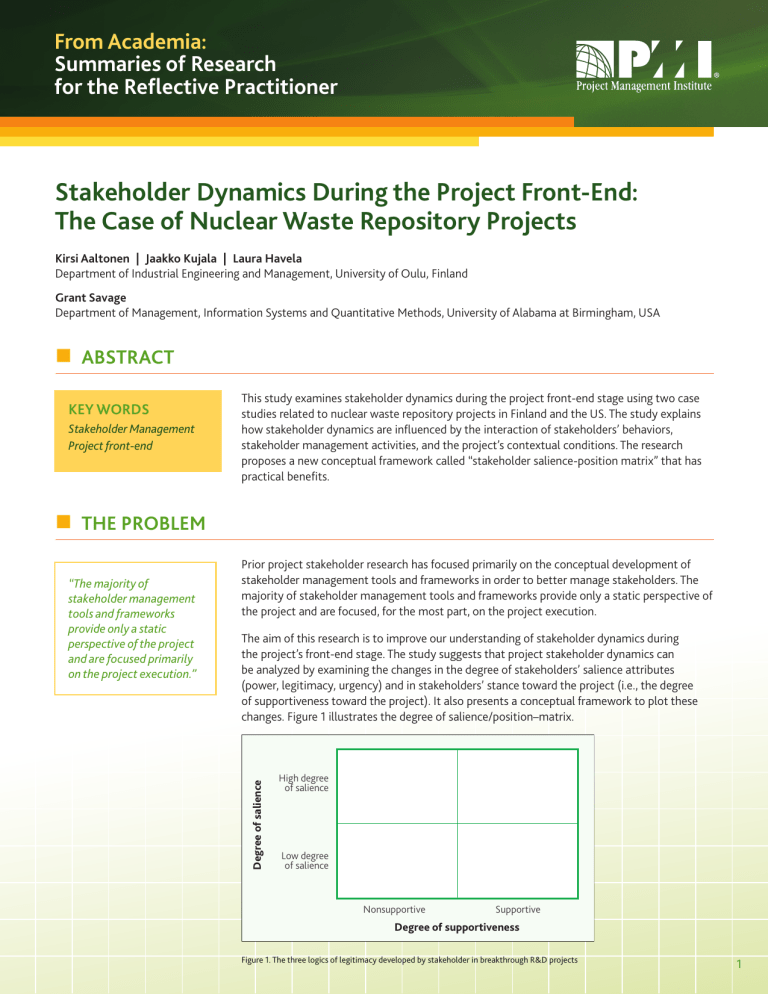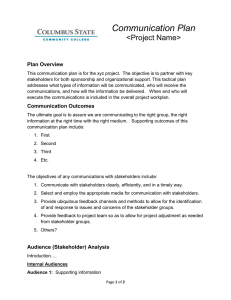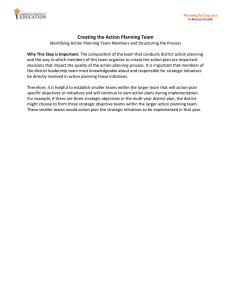
From Academia:
Summaries of Research
for the Reflective Practitioner
Stakeholder Dynamics During the Project Front-End:
The Case of Nuclear Waste Repository Projects
Kirsi Aaltonen | Jaakko Kujala | Laura Havela
Department of Industrial Engineering and Management, University of Oulu, Finland
Grant Savage
Department of Management, Information Systems and Quantitative Methods, University of Alabama at Birmingham, USA
ABSTRACT
KEY WORDS
Stakeholder Management
Project front-end
This study examines stakeholder dynamics during the project front-end stage using two case
studies related to nuclear waste repository projects in Finland and the US. The study explains
how stakeholder dynamics are influenced by the interaction of stakeholders’ behaviors,
stakeholder management activities, and the project’s contextual conditions. The research
proposes a new conceptual framework called “stakeholder salience-position matrix” that has
practical benefits.
THE PROBLEM
The aim of this research is to improve our understanding of stakeholder dynamics during
the project’s front-end stage. The study suggests that project stakeholder dynamics can
be analyzed by examining the changes in the degree of stakeholders’ salience attributes
(power, legitimacy, urgency) and in stakeholders’ stance toward the project (i.e., the degree
of supportiveness toward the project). It also presents a conceptual framework to plot these
changes. Figure 1 illustrates the degree of salience/position–matrix.
Degree of salience
“The majority of
stakeholder management
tools and frameworks
provide only a static
perspective of the project
and are focused primarily
on the project execution.”
Prior project stakeholder research has focused primarily on the conceptual development of
stakeholder management tools and frameworks in order to better manage stakeholders. The
majority of stakeholder management tools and frameworks provide only a static perspective of
the project and are focused, for the most part, on the project execution.
High degree
of salience
Low degree
of salience
Nonsupportive
Supportive
Degree of supportiveness
Figure 1. The three logics of legitimacy developed by stakeholder in breakthrough R&D projects
1
1
THE METHOD
The study is based on two multi-stakeholder case projects: Onkalo is a successful nuclear
repository project in Finland, and Yucca Mountain is a fiercely debated nuclear repository
project in Nevada, USA. The empirical data come from publicly available electronic information
on the two projects including: event and stakeholder databases (including their goals, degree
of supportiveness toward the project, degree of salience); and management strategies. This
information was used to write descriptions covering the key events of both cases, and plot
stakeholder maps displaying the changes in their degrees of salience (power, legitimacy and
urgency) and support, as well as the reasons for these changes.
FINDINGS AND PRACTICAL IMPLICATIONS
“Stakeholder’ salience and
support evolved over time.”
“The influence strategies
used by stakeholders
have direct impact on the
stakeholder’s dynamics.”
“Stakeholder management
strategies have direct
impact on stakeholder’s
dynamics.”
“Contextual conditions
have direct impact on
stakeholder’s dynamics.”
Stakeholder salience and support evolved over time. Both cases demonstrate the different
types of stakeholder dynamics during the early phases of a large and complex project. From the
two cases, Yucca Mountain clearly featured more dramatic changes in the positions of salient
stakeholders.
The influence strategies used by stakeholders have direct impact on the stakeholder dynamics.
In both cases, the stakeholders used various influence strategies to increase salience attributes
and overcome stakeholders’ positions (e.g. forming nongovernmental organizations,
demonstrations, etc.).
Likewise, stakeholder management strategies have direct impact on stakeholder dynamics.
Onkalo case showed that early and proactive engagement by the project owner into
stakeholder’s management pays dividends. Being open, flexible and sensitive toward the varying
opinions and signals from the environment is crucial. On the other hand, Yucca Mountain case
showed that procrastination in stakeholder management is very harmful.
Finally, contextual conditions have both indirect and direct impacts on stakeholder dynamics.
Although contextual conditions can moderate the ways stakeholders and project managers
use their respective influences, they may also directly induce stakeholder dynamics. In Onkalo
case, the context enabled a much more open and transparent policy, which resulted in a benefit
for the project owner in dealing with opposing stakeholders. The Yucca Mountain case was
restricted to a more closed and fixed process, which increased the fears and consequently the
degree of reaction from opposing stakeholders
CONCLUDING REMARKS
Understanding stakeholder dynamics and their impact on project management is extremely
important in order to evaluate the viability of large and complex projects.
The stakeholder salience-position matrix offers a very useful analytical framework for
stakeholder analysis and management.
The results from this study support prior research describing the front-end phase as an iterative
and drifting process heavily characterized by power game among stakeholders. Both cases
show that in scenarios with multiple and contradictory goals, it is critical that all interests and
claims are taken into account by a flexible stakeholder management process.
Governance structures contribute to success by keeping decision-makers primarily focused
on the success and effectiveness of the project. Otherwise, political pressures may cause the
project to drift from its goals.
2
FULL CITATION
Kirsi Aaltonen, Jaakko Kujala, Laura Havela, Grant Savage. Stakeholder Dynamics During the
Project Front-End: The Case of Nuclear Waste Repository Projects. Project Management Journal,
December 2015/January 2016. Volume 46, Number 6.
FOR MORE INFORMATION
n
PMJ articles and Sponsored Research monographs are available to members for
free download.
n
Monographs can also be purchased at the PMI Store on PMI.org.
From Academia: Summaries of Research for the Reflective Practitioner | April 2016
PROJECT MANAGEMENT INSTITUTE
14 Campus Blvd | Newtown Square, PA | 19073-3299 USA
Tel: +1 610 356 4600 | Fax: +1 610 356 4647
e-mail: research.program@pmi.org | PMI.org/research
© 2016 Project Management Institute, Inc.
All rights reserved. “PMI” and the PMI logo are
marks of Project Management Institute, Inc.
For a comprehensive list of PMI marks, contact
the PMI Legal Department. ACA-253-2015
3



